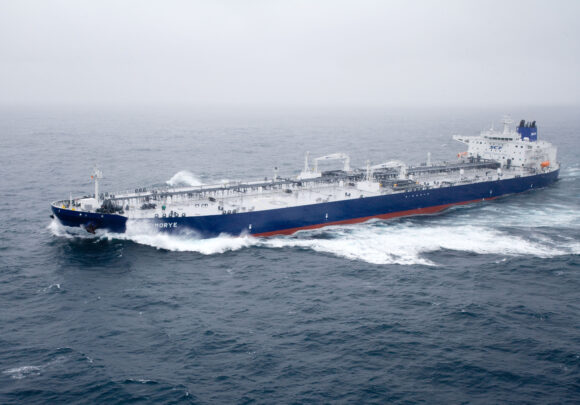The G-7 sanctions on Russian oil, which include a $60 per barrel price cap and restrictions on key services such as insurance, may have unintended consequences, according to a maritime insurance specialist.
One of those consequences is the creation of competing protection & indemnity insurance markets for marine coverages in Russia, India and other countries, said Cormac Mc Garry, senior analyst, Maritime, at Control Risks, the global risk and strategic consulting firm, in an interview with Insurance Journal.

“About half of the world either does not agree or necessarily care about G-7 and European Union sanctions against Russia,” Mc Garry said. “Half the world wants to consume that oil at whatever price they can get it and Russia wants to continue exporting to them, and that’s what they’re trying to do.”
In short, these sanctions are only effective as long as nations follow them, he said.
The sanctions, which became effective on Dec. 5, restrict financing, brokerage, shipping and insurance services to ship Russian oil if the crude is bought above a cap of $60 per barrel. If crude oil is traded at or below $60, then countries participating in the cap, which include the G-7, the European Union and Australia, will allow access to key services.
While insurance has been wielded as the teeth in the sanctions, the West doesn’t have a monopoly on shipping insurance, Mc Garry noted.
The 13 protection and indemnity (P&I) clubs, which comprise the International Group of P&I Clubs, together provide marine liability cover (also known as protection and indemnity) for approximately 90% of the world’s ocean-going tonnage.
It is intended that the P&I insurance from these clubs, which are based in the UK, Europe, U.S. and Japan, will provide the enforcement teeth for the sanctions.
While the West does have some power through the insurance angle, Mc Garry said, even that is precarious because “it looks like it’s going to spur a proliferation of insurance markets beyond the traditional Western center.”
Russia’s Ingosstrakh said recently that it has no plans to offer policies to new clients who lose their coverage from international insurers.
Mc Garry noted that Ingosstrakh insures about 2000 ships, which is fairly small in comparison to the market share of the 13 Western P&I clubs, “but the foundation is there for Russia to start insuring its own domestic fleet as well as the foreign flags it’s using.”
Russia Poised to Largely Circumvent G-7 Oil Price Cap, Insurance Restrictions
Ingosstrakh is effectively a state organization, so the Kremlin can just come in and begin reinsuring the policies and avoid Western P&I clubs altogether, he explained.
And the same holds true for India and other nations, which are heavy importers of Russian oil, Mc Garry said, explaining that they could form their own P&I clubs, break the $60 price cap and import the oil. “I don’t think anyone’s going to do anything about it, which is a signal of how effective the sanctions are.”
He did not believe that the creation of new P&I market would unseat the 13 P&I clubs, although within a year they might see a reduction of a few percentage points from their current 90% coverage of the global fleet.
The International Group of P&I Clubs was not available for comment.
“It will be interesting to see if [the new P&I clubs] can actually compete in the post-sanctions environment,” said Mc Garry.
He emphasized that Western sanctions against Russia are pretty measured and could have been much harsher. “The $60 price cap is not as extreme as it could be. It’s a pretty mild sanction from the West.”
The G-7 nations were probably considering the impact on the global economy, “which is already pretty fragmented and fragile, so they were only willing to push the sanction button so far, while also turning a blind eye to those who ignore it,” he said.
Further, the West, via NATO member Turkey, in theory, has the ability to completely shut off the export of Russian oil, he said. “In terms of shipping, Russia is almost completely reliant on the Black Sea and the Bosphorus Strait because most of its other ports freeze during the winter.”
It’s possible, Mc Garry said, but then the West might be “poking the ‘Russian bear’ too hard” and hitting the world economy “in a way that perhaps the West just doesn’t want to do.”
Photograph: Suezmax crude oil tanker SCF Primorye. Photo credit: Sovcomflot (SCF)
Related:
- Ship Reinsurers to Cease Covering War-Related Risks Related to Conflict in Ukraine
- Oil Tanker Owners Show Signs of Shunning Russia’s Crude in Response to G-7 Sanctions
Topics Russia
Was this article valuable?
Here are more articles you may enjoy.



 AIG’s Zaffino: Outcomes From AI Use Went From ‘Aspirational’ to ‘Beyond Expectations’
AIG’s Zaffino: Outcomes From AI Use Went From ‘Aspirational’ to ‘Beyond Expectations’  Florida Engineers: Winds Under 110 mph Simply Do Not Damage Concrete Tiles
Florida Engineers: Winds Under 110 mph Simply Do Not Damage Concrete Tiles  State Farm Adjuster’s Opinion Does Not Override Policy Exclusion in MS Sewage Backup
State Farm Adjuster’s Opinion Does Not Override Policy Exclusion in MS Sewage Backup  World’s Growing Civil Unrest Has an Insurance Sting
World’s Growing Civil Unrest Has an Insurance Sting 

